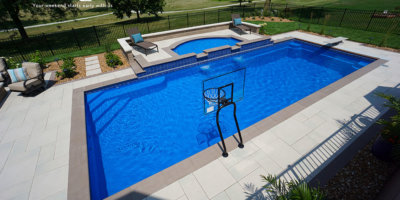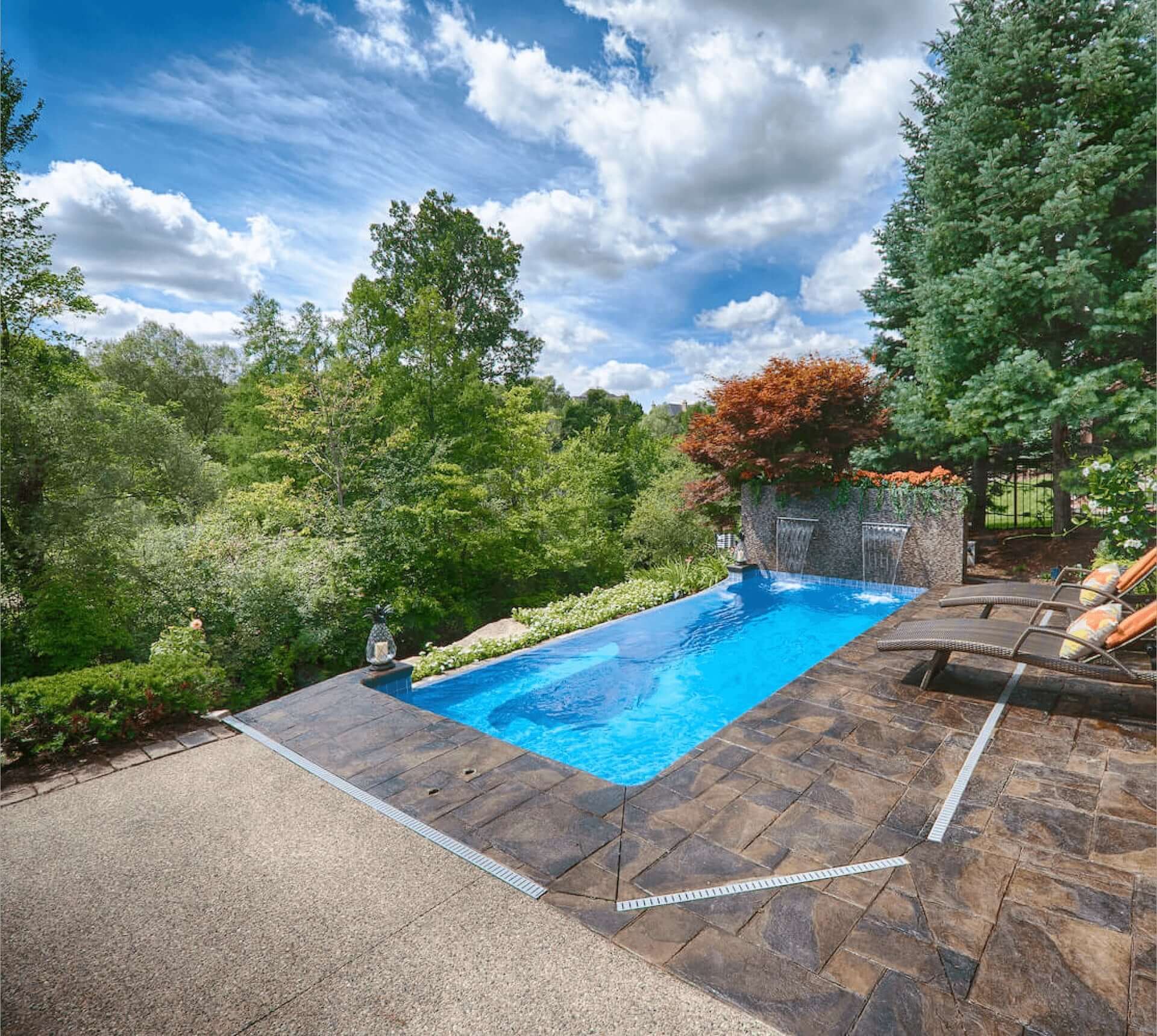877-929-7665
What is the Downside to Fiberglass Pools? 3 Myths & 3 Truths
 If you are considering an inground pool, you will quickly realize that much information is available. You will likely first consider what type of pool is right for you as you compare the three different inground pool types. Looking for the pros and cons of fiberglass pools vs. concrete or vinyl liners can help you narrow down your preferred pool type. If you’ve already narrowed it down to fiberglass pools, you may even have Googled, “What is the downside to fiberglass pools?” or “How long do fiberglass pools last?” to see what results you may get. (Smart move). Though it may seem odd that a fiberglass pool manufacturer is addressing this question, it would be even more strange to pretend that a fiberglass pool is for everyone. Everyone should buy the best pool type for them, so this post will address some myths and truths about the downside to fiberglass pools.
If you are considering an inground pool, you will quickly realize that much information is available. You will likely first consider what type of pool is right for you as you compare the three different inground pool types. Looking for the pros and cons of fiberglass pools vs. concrete or vinyl liners can help you narrow down your preferred pool type. If you’ve already narrowed it down to fiberglass pools, you may even have Googled, “What is the downside to fiberglass pools?” or “How long do fiberglass pools last?” to see what results you may get. (Smart move). Though it may seem odd that a fiberglass pool manufacturer is addressing this question, it would be even more strange to pretend that a fiberglass pool is for everyone. Everyone should buy the best pool type for them, so this post will address some myths and truths about the downside to fiberglass pools.
What are the perceived negatives of a fiberglass pool?
Myth 1: Fiberglass pools are slippery.
Between the clear water shimmering in the sun and the high-gloss finish of a fiberglass pool, it’s logical to think it’s slippery. However, over the years, technological advances have resulted in a gelcoat finish for fiberglass pools that is smooth but non-skid. Fiberglass pools are comfortable on your feet (and your pet’s paws), will not snag your suit, and they aren’t slippery. But of course, anywhere there’s water can cause accidents to happen, so always be careful when entering and exiting or walking around any pool type.
Myth: Fiberglass pool designs are “slim pickins.”
Some people assume fiberglass pool designs are punched out like widgets because they are manufactured in a controlled environment and shipped to the site. Go back a few decades, and there indeed were fewer options. However, today, fiberglass pools come in an array of sizes, shapes, and colors. Fiberglass pool manufacturers like Thursday Pools are constantly innovating to provide new options and built-in features, such as beach entry pools (Patent US 10,472,839).
Myth 2: Fiberglass pool designs are “slim pickings.”
While fiberglass pools are manufactured from molds in a controlled environment and shipped to your site, there are many options. Go back a few decades, and that wasn’t the case. However, modern fiberglass pools come in an array of sizes, shapes, and colors. Thursday Pools is constantly innovating to provide new options and built-in features to our fiberglass pool shells and was first on the scene with beach entry fiberglass pools (Patent US 10,472,839).
Myth 3: Fiberglass is weak and brittle compared to other pool types.
Don’t be fooled by the name—fiberglass is not fragile. In reality, fiberglass is incredibly strong and flexible, making it highly resistant to cracking and wear. Fiberglass pools withstand shifts in soil and ground movement, making them durable in varied climates. A testament to their durability, fiberglass pools can last several decades when properly maintained.
What are the negatives of a fiberglass pool?
Truth 1: Fiberglass pools aren’t customizable in terms of size and shape.
Because they arrive on site in one piece, and the Department of Transportation limits what can be hauled down our roads without tighter regulations and a more extensive approval process, fiberglass pools are typically only 16 feet wide. So, fiberglass may not be for you if your pool must extend beyond 16 feet wide or 40 feet long. You also can’t get a fiberglass pool shaped like a guitar (unless a fiberglass pool manufacturer adds it to their design lineup).
Truth 2: The initial cost may be higher than other pool types.
It will likely cost more upfront to purchase a fiberglass pool than some other pool types. However, because you’ll save on maintenance and there is no liner to replace, the lifetime cost of a fiberglass pool is typically lower. So, if you need to spend less upfront, fiberglass may not be your best option. Check out our Pool Cost Calculator if you’d like a ballpark estimate for a fiberglass pool.
Truth 3: It’s not a DIY project.
A fiberglass pool is a lifetime purchase, but that’s only true if properly installed. A DIY installation voids the pool’s warranty. In any case, we wouldn’t recommend that the average homeowner, or even an above-average DIYer, attempt to install a fiberglass pool. That’s one reason we don’t sell directly to the general public. An experienced pool builder should install a fiberglass pool to prevent horror stories like the pool popping out of the ground or damage to the pool or house from trying to position the pool.
More Research Options
Check out YouTube, Pinterest, Houzz, and fiberglass pool reviews if you want more research options. Use our online resources, such as our “Everything You Need To Know About Fiberglass Pools” page. Or talk to an independent dealer. Consider what questions you might ask them in advance. Questions for a pool builder might include: Do they have a warranty? What type of pool is their specialty? What is their lead time, and what does their installation schedule look like? What pool shapes, sizes, and design options do they offer? What about financing?
There are advantages and disadvantages to fiberglass pools, so it’s essential to determine what you are looking for in your swimming pool to make the best decision for your and your family’s needs. Hopefully, this article has aided your decision, as fiberglass pool regrets are the last thing we’d want a pool buyer to experience.
